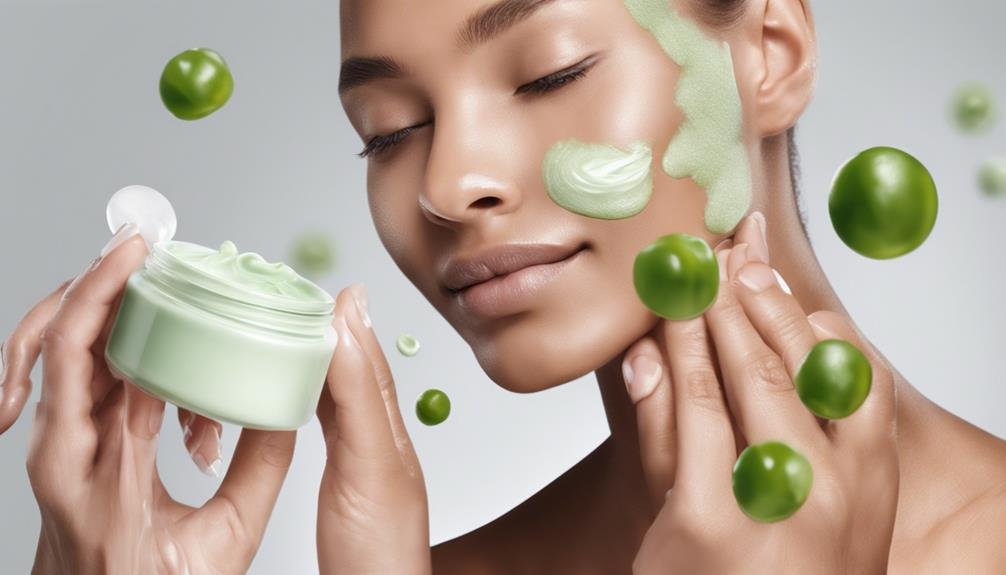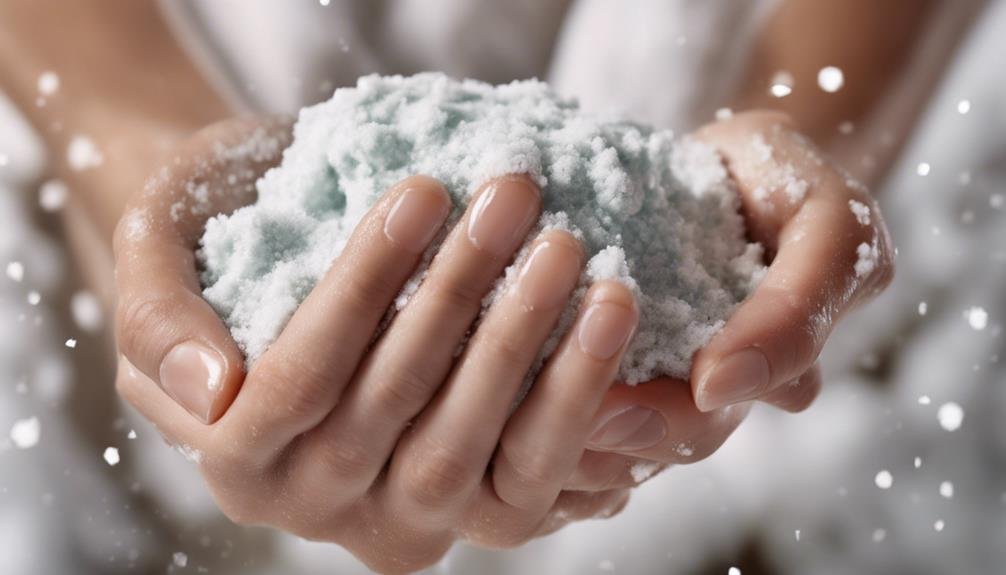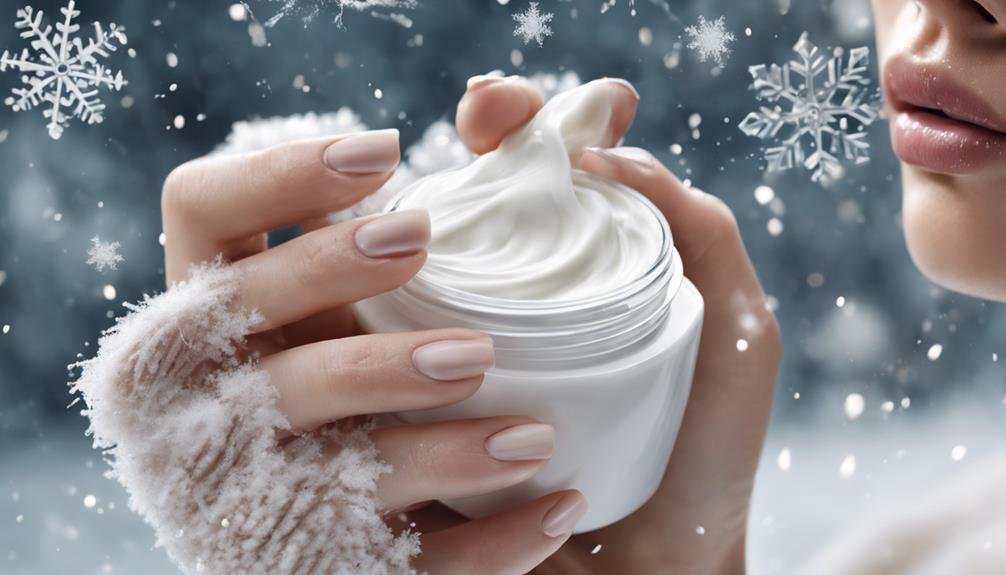As the winter chill sets in, your skin may start to feel tight and parched, signaling the need for extra care and attention. Ensuring your skin remains well-hydrated in the colder months is vital for maintaining its health and radiance. But how can you navigate the world of moisturizing effectively to combat dryness during winter? Let's explore some expert tips that will help you keep your skin supple and glowing even in the harshest weather conditions.
Key Takeaways
- Use a rich moisturizer with hydrating ingredients like hyaluronic acid.
- Apply moisturizer on damp skin for better absorption.
- Drink plenty of water to stay hydrated from within.
- Use lukewarm water to cleanse and prevent skin dryness.
- Protect skin with SPF and cover up in cold weather.
Importance of Hydration
Ensuring your skin stays hydrated during the harsh winter months is crucial for maintaining its health and vitality. Winter weather can strip your skin of its natural oils, leading to dryness, irritation, and even cracking. To combat these effects, it's essential to incorporate a hydrating skincare routine into your daily regimen.
Drinking an adequate amount of water is the first step in keeping your skin hydrated from the inside out. Additionally, using a gentle cleanser that doesn't strip the skin of its moisture barrier is key.
During winter, consider using a humidifier in your home to add moisture to the air, which can help prevent your skin from drying out. When showering, opt for lukewarm water instead of hot, as hot water can further dehydrate your skin. After cleansing, apply a rich moisturizer while your skin is still damp to lock in hydration.
Choose the Right Moisturizer
During the winter season, selecting the right moisturizer is essential for maintaining your skin's health and combating dryness. Here are some tips to help you choose the perfect moisturizer that suits your skin's needs:
- Consider Your Skin Type: Whether you have oily, dry, combination, or sensitive skin, there's a moisturizer designed for you. Understanding your skin type will help you find a product that works best for you.
- Look for Key Ingredients: Ingredients like hyaluronic acid, glycerin, shea butter, and ceramides are known for their hydrating properties. Opt for a moisturizer that contains these ingredients to keep your skin moisturized and healthy.
- Choose the Right Texture: Depending on your skin type, you may prefer a lightweight lotion, a rich cream, or a hydrating oil. Select a texture that feels comfortable on your skin and provides the level of hydration you need.
- Check for SPF Protection: Even in the winter, UV rays can still damage your skin. Opt for a moisturizer with SPF to protect your skin from the sun's harmful effects.
Apply Moisturizer Correctly
To properly moisturize your skin, it's crucial to follow the correct application technique. After cleansing your face or body, pat your skin dry with a towel, leaving it slightly damp. This helps lock in moisture more effectively.
Dispense an appropriate amount of moisturizer onto your fingertips and gently begin to massage it into your skin using circular motions. Start from the center of your face or the driest areas of your body, then work your way outwards. Be sure to pay extra attention to areas prone to dryness, such as elbows, knees, and hands.
When applying moisturizer, don't forget about your neck and chest, as these areas can also become dry and require hydration. Allow the moisturizer to fully absorb into your skin before applying any makeup or getting dressed.
For daytime use, opt for a moisturizer with SPF to protect your skin from the sun's harmful rays. By following these steps, you can effectively nourish and protect your skin during the winter months.
Use Lukewarm Water
Using lukewarm water is essential for maintaining the health and hydration of your skin, especially during the winter months when hot water can strip away natural oils. Here are four reasons why incorporating lukewarm water into your skincare routine can make a significant difference:
- Preserves Natural Oils: Lukewarm water helps to cleanse your skin without stripping away the natural oils that act as a protective barrier, keeping your skin moisturized and healthy.
- Prevents Dryness: Hot water can lead to dry and irritated skin, especially in colder weather. Lukewarm water is gentler and helps retain moisture, preventing dryness and flakiness.
- Minimizes Redness: Hot water can exacerbate skin conditions like rosacea, leading to increased redness. Lukewarm water is soothing and reduces the risk of red, irritated skin.
- Enhances Absorption: Lukewarm water opens up your pores slightly, allowing your skincare products to penetrate more effectively, maximizing their benefits for your skin.
Incorporating lukewarm water into your skincare routine can help maintain your skin's health and hydration, especially during the harsh winter months.
Exfoliate Regularly
For optimal skin health, exfoliating regularly is a crucial step in your skincare routine. Exfoliation helps to remove dead skin cells, allowing your moisturizer to penetrate deeper and work more effectively. In winter, when your skin can become dry and flaky, exfoliating becomes even more important to maintain a healthy glow.
Choose a gentle exfoliator that suits your skin type. If you have sensitive skin, opt for a milder exfoliant with fine particles to avoid irritation. For oily skin, a slightly more abrasive exfoliator can help unclog pores and prevent breakouts. Remember to exfoliate no more than 1-2 times a week to avoid over-exfoliation, which can strip your skin of its natural oils and cause damage.
After exfoliating, follow up with a rich moisturizer to hydrate and nourish your skin. This combination will leave your skin feeling soft, smooth, and rejuvenated, ready to face the harsh winter weather with confidence.
Humidify Your Home
Maintaining the right humidity levels in your home is essential for combating the dry air of winter. Proper humidification can help keep your skin hydrated and healthy during the cold months. Here are some tips to help you humidify your home effectively:
- Use a Humidifier: Invest in a good quality humidifier to add moisture to the air in your home.
- Monitor Humidity Levels: Keep an eye on the humidity levels in your home using a hygrometer. Aim for a range of 30-50% humidity.
- Place Plants: Indoor plants not only add a touch of green to your space but also release moisture through transpiration, naturally increasing humidity.
- Ventilation: Properly ventilate your home by opening windows periodically to let in fresh, moist air.
Protect Your Skin
To shield your skin from the harsh effects of winter weather, ensuring proper hydration and protection is paramount. The cold, dry air can strip your skin of its natural oils, leading to dryness, irritation, and even cracking.
To combat this, opt for a rich, emollient moisturizer that contains ingredients like hyaluronic acid, glycerin, or shea butter to lock in moisture and create a protective barrier. Apply your moisturizer immediately after showering or washing your face to seal in the hydration.
In addition to moisturizing, don't forget to protect your skin from the elements. Wear gloves, scarves, and hats to shield your skin from cold winds and low temperatures.
If you'll be spending an extended period outdoors, consider using a facial oil or balm for added protection. These products can provide an extra layer of moisture and help prevent windburn and chapping.
Don't Forget Sunscreen
Even during the winter months, the importance of sunscreen can't be overstated. As you bundle up in layers to protect from the cold, remember that the sun's harmful rays can still penetrate your skin, leading to long-term damage. Here are some crucial reasons why sunscreen should be a part of your winter skincare routine:
- Protection: Sunscreen shields your skin from harmful UV rays, reducing the risk of skin cancer and premature aging.
- Even on Cloudy Days: UV rays can penetrate through clouds, so wearing sunscreen daily is essential, regardless of the weather.
- Maintain Skin Health: Sunscreen helps maintain your skin's health by preventing sunburns, dark spots, and other skin issues.
- Year-Round Care: Consistent use of sunscreen throughout the year ensures your skin is protected and healthy, no matter the season.
Integrate sunscreen into your daily routine to safeguard your skin and maintain its wellbeing, even during the winter months.
Stay Hydrated From Within
Staying hydrated from within is a fundamental aspect of maintaining healthy skin, especially during the winter season. The cold air, indoor heating, and hot showers can all contribute to dehydrating your skin. It's vital to drink plenty of water throughout the day to help your skin stay moisturized and supple. Aim for at least eight glasses a day, and consider incorporating hydrating foods like fruits and vegetables into your diet.
Additionally, herbal teas and warm water with lemon can be soothing options that also contribute to your hydration levels. Avoiding excessive caffeine and alcohol consumption is advisable since they can dehydrate your body.
Consider Overnight Treatments
Consider incorporating overnight treatments into your skincare routine to combat the effects of winter weather on your skin. Overnight treatments can provide intense hydration and repair to counteract the dryness and irritation caused by cold temperatures. Here are some reasons why incorporating these treatments can be beneficial:
- Deep Nourishment: Overnight treatments are formulated with potent ingredients that deeply nourish and replenish your skin while you sleep, leaving it soft and supple in the morning.
- Repair and Renewal: These treatments work during the night to repair any damage your skin has endured throughout the day, promoting cell renewal and overall skin health.
- Locking in Moisture: By applying an overnight treatment, you create a barrier that helps lock in moisture, preventing dehydration and ensuring your skin stays hydrated.
- Enhanced Results: Using overnight treatments consistently can lead to long-term improvements in your skin's texture, elasticity, and overall appearance, making it an essential step in your winter skincare routine.
Wear Protective Clothing
To shield your skin from the harsh effects of winter weather, wearing protective clothing is a smart strategy. When the temperature drops and the air becomes drier, your skin can easily become dehydrated and irritated. Opt for clothing made from soft, breathable fabrics like cotton or silk to help prevent chafing and irritation.
Layering your clothing can also help you stay warm without causing your skin to overheat and sweat excessively, which can lead to further dryness and discomfort.
Don't forget to cover up exposed areas such as your hands, face, and neck with gloves, scarves, and hats. These accessories not only keep you warm but also act as a barrier against the cold winds that can strip your skin of its natural oils.
Additionally, wearing sunscreen is crucial even in the winter months to protect your skin from harmful UV rays that can still penetrate through clouds and cause damage. By being mindful of the clothing you wear, you can help maintain your skin's moisture levels and keep it healthy throughout the winter season.
Seek Professional Help if Needed
If you find that your skin is still struggling despite your best efforts to combat the winter weather, seeking professional help may be the solution you need. Sometimes, despite our best attempts, our skin needs a little extra care that only a dermatologist or skincare specialist can provide.
Here are some reasons why seeking professional help is essential:
- Customized Treatment: Professionals can assess your skin's specific needs and tailor a treatment plan that suits you best, ensuring optimal results.
- Advanced Technology: Dermatologists have access to the latest technologies and treatments that can address skin issues more effectively than over-the-counter products.
- Expert Advice: Professionals can provide expert advice on skincare routines, products, and lifestyle changes to improve your skin's health in the long term.
- Prevent Further Damage: Seeking professional help early can prevent minor skin issues from escalating into more severe conditions, saving you time, money, and discomfort in the long run.
Don't hesitate to reach out to a skincare expert if you feel your skin needs more specialized care during the winter months.
Frequently Asked Questions
How Often Should I Reapply Moisturizer During the Day?
You should reapply moisturizer during the day based on your skin's needs. A good rule of thumb is every 4-6 hours, but adjust as needed if your skin feels dry or tight.
Can I Use Body Lotion on My Face in Winter?
Yes, you can use body lotion on your face in winter. However, be cautious as body lotions are often heavier and may clog facial pores. Opt for a facial moisturizer designed for the face's delicate skin for better results.
Is It Necessary to Moisturize Oily Skin in Winter?
Yes, it's essential to moisturize oily skin in winter. Cold weather can dehydrate your skin, leading to increased oil production. Opt for oil-free, non-comedogenic moisturizers to maintain skin balance. Don't skip this step for healthy, balanced skin.
What Ingredients Should I Avoid in Winter Moisturizers?
When choosing winter moisturizers, avoid ingredients like alcohol, fragrances, and sulfates that can strip your skin of moisture. Opt for products with hyaluronic acid, glycerin, and ceramides to keep your skin hydrated and protected during the colder months.
Can I Apply Moisturizer Over Makeup for Added Hydration?
You can indeed add hydration by applying moisturizer over makeup. Gently pat it on for a dewy glow. Remember, a little goes a long way. Embrace the glow-up without clogging pores. Your skin will thank you.
Conclusion
In conclusion, remember the importance of hydration during winter weather. Choose the right moisturizer, apply it correctly, and use lukewarm water for cleansing. Exfoliate regularly, stay hydrated from within, and consider overnight treatments for optimal skin health. Don't forget to wear protective clothing and seek professional help if needed. Prioritize proper moisturizing to combat dryness and irritation, and keep your skin glowing and hydrated all winter long.







